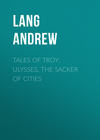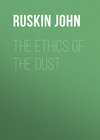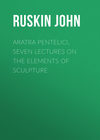Kitabı oku: «The Queen of the Air: Being a Study of the Greek Myths of Cloud and Storm»
PREFACE
My days and strength have lately been much broken; and I never more felt the insufficiency of both than in preparing for the press the following desultory memoranda on a most noble subject. But I leave them now as they stand, for no time nor labor would be enough to complete them to my contentment; and I believe that they contain suggestions which may be followed with safety, by persons who are beginning to take interest in the aspects of mythology, which only recent investigation has removed from the region of conjecture into that of rational inquiry. I have some advantage, also, from my field work, in the interpretation of myths relating to natural phenomena; and I have had always near me, since we were at college together, a sure, and unweariedly kind, guide, in my friend Charles Newton, to whom we owe the finding of more treasure in mines of marble than, were it rightly estimated, all California could buy. I must not, however, permit the chance of his name being in any wise associated with my errors. Much of my work as been done obstinately in my own way; and he is never responsible for me, though he has often kept me right, or at least enabled me to advance in a new direction. Absolutely right no one can be in such matters; nor does a day pass without convincing every honest student of antiquity of some partial error, and showing him better how to think, and where to look. But I knew that there was no hope of my being able to enter with advantage on the fields of history opened by the splendid investigation of recent philologists, though I could qualify myself, by attention and sympathy, to understand, here and there, a verse of Homer's or Hesiod's, as the simple people did for whom they sang.
Even while I correct these sheets for press, a lecture by Professor Tyndall has been put into my hands, which I ought to have heard last 16th January, but was hindered by mischance; and which, I now find, completes, in two important particulars, the evidence of an instinctive truth in ancient symbolism; showing, first, that the Greek conception of an ætherial element pervading space is justified by the closest reasoning of modern physicists; and, secondly, that the blue of the sky, hitherto thought to be caused by watery vapour, is, indeed, reflected from the divided air itself; so that the bright blue of the eyes of Athena, and the deep blue of her ægis, prove to be accurate mythic expressions of natural phenomena which it is an uttermost triumph of recent science to have revealed.
Indeed, it would be difficult to imagine triumph more complete. To form, "within an experimental tube, a bit of more perfect sky than the sky itself!" here is magic of the finest sort! singularly reversed from that of old time, which only asserted its competency to enclose in bottles elemental forces that were—not of the sky.
Let me, in thanking Professor Tyndall for the true wonder of this piece of work, ask his pardon, and that of all masters in physical science, for any words of mine, either in the following pages or elsewhere, that may ever seem to fail in the respect due to their great powers of thought, or in the admiration due to the far scope of their discovery. But I will be judged by themselves, if I have not bitter reason to ask them to teach us more than yet they have taught.
This first day of May, 1869, I am writing where my work was begun thirty-five years ago, within sight of the snows of the higher Alps. In that half of the permitted life of man, I have seen strange evil brought upon every scene that I best loved, or tried to make beloved by others. The light which once flushed those pale summits with its rose at dawn, and purple at sunset, is now umbered and faint; the air which once inlaid the clefts of all their golden crags with azure is now defiled with languid coils of smoke, belched from worse than volcanic fires; their very glacier waves are ebbing, and their snows fading, as if hell had breathed on them; the waters that once sank at their feet into crystalline rest are now dimmed and foul, from deep to deep, and shore to shore. These are no careless words—they are accurately, horribly, true. I know what the Swiss lakes were; no pool of Alpine fountain at its source was clearer. This morning, on the Lake of Geneva, at half a mile from the beach, I could scarcely see my oar-blade a fathom deep.
The light, the air, the waters, all defiled! How of the earth itself? Take this one fact for type of honour done by the modern Swiss to the earth of his native land. There used to be a little rock at the end of the avenue by the port of Neuchâtel; there, the last marble of the foot of Jura, sloping to the blue water, and (at this time of year) covered with bright pink tufts of Saponaria. I went, three days since, to gather a blossom at the place. The goodly native rock and its flowers were covered with the dust and refuse of the town; but, in the middle of the avenue, was a newly-constructed artificial rockery, with a fountain twisted through a spinning spout, and an inscription on one of its loose-tumbled stones,—
"Aux Botanistes,
Le club Jurassique,"
Ah, masters of modern science, give me back my Athena out of your vials, and seal, if it may be, once more, Asmodeus therein. You have divided the elements, and united them; enslaved them upon the earth, and discerned them in the stars. Teach us now, but this of them, which is all that man need know,—that the Air is given to him for his life; and the Rain to his thirst, and for his baptism; and the Fire for warmth; and the Sun for sight; and the Earth for his Meat—and his Rest.
VEVAY, May 1, 1869.
I.
ATHENA CHALINITIS. 1
(Athena in the Heavens.)
LECTURE ON THE GREEK MYTHS OF STORM, GIVEN (PARTLY) IN UNIVERSITY COLLEGE, LONDON, MARCH 9, 1869
1. I will not ask your pardon for endeavoring to interest you in the subject of Greek Mythology; but I must ask your permission to approach it in a temper differing from that in which it is frequently treated. We cannot justly interpret the religion of any people, unless we are prepared to admit that we ourselves, as well as they, are liable to error in matters of faith; and that the convictions of others, however singular, may in some points have been well founded, while our own, however reasonable, may be in some particulars mistaken. You must forgive me, therefore, for not always distinctively calling the creeds of the past "superstition," and the creeds of the present day "religion;" as well as for assuming that a faith now confessed may sometimes be superficial, and that a faith long forgotten may once have been sincere. It is the task of the Divine to condemn the errors of antiquity, and of the philologists to account for them; I will only pray you to read, with patience, and human sympathy, the thoughts of men who lived without blame in a darkness they could not dispel; and to remember that, whatever charge of folly may justly attach to the saying, "There is no God," the folly is prouder, deeper, and less pardonable, in saying, "There is no God but for me."
2. A myth, in its simplest definition, is a story with a meaning attached to it other than it seems to have at first; and the fact that it has such a meaning is generally marked by some of its circumstances being extraordinary, or, in the common use of the word, unnatural. Thus if I tell you that Hercules killed a water-serpent in the lake of Lerna, and if I mean, and you understand, nothing more than that fact, the story, whether true or false, is not a myth. But if by telling you this, I mean that Hercules purified the stagnation of many streams from deadly miasmata, my story, however simple, is a true myth; only, as, if I leftit in that simplicity, you would probably look for nothing beyond, it will be wise in me to surprise your attention by adding some singular circumstance; for instance, that the water-snake had several heads, which revived as fast as they were killed, and which poisoned even the foot that trod upon them as they slept. And in proportion to the fulness of intended meaning I shall probably multiply and refine upon these improbabilities; as, suppose, if, instead of desiring only to tell you that Hercules purified a marsh, I wished you to understand that he contended with the venom and vapor of envy and evil ambition, whether in other men's souls or in his own, and choked that malaria only by supreme toil,—I might tell you that this serpent was formed by the goddess whose pride was in the trial of Hercules; and that its place of abode as by a palm-tree; and that for every head of it that was cut off, two rose up with renewed life; and that the hero found at last that he could not kill the creature at all by cutting its heads off or crushing them, but only by burning them down; and that the midmost of them could not be killed even that way, but had to be buried alive. Only in proportion as I mean more, I shall certainly appear more absurd in my statement; and at last when I get unendurably significant, all practical persons will agree that I was talking mere nonsense from the beginning, and never meant anything at all.
3. It is just possible, however, also, that the story-teller may all along have meant nothing but what he said; and that, incredible as the events may appear, he himself literally believed—and expected you also to believe—all this about Hercules, without any latent moral or history whatever. And it is very necessary, in reading traditions of this kind, to determine, first of all, whether you are listening to a simple person, who is relating what, at all events, he believes to be true, (and may, therefore, possibly have been so to some extent), or to a reserved philosopher, who is veiling a theory of the universe under the grotesque of a fairy tale. It is, in general, more likely that the first supposition should be the right one: simple and credulous persons are, perhaps fortunately, more common than philosophers; and it is of the highest importance that you should take their innocent testimony as it was meant, and not efface, under the graceful explanation which your cultivated ingenuity may suggest, either the evidence their story may contain (such as it is worth) of an extraordinary event having really taken place, or the unquestionable light which it will cast upon the character of the person by whom it was frankly believed. And to deal with Greek religion honestly, you must at once understand that this literal belief was, in the mind of the general people, as deeply rooted as ours in the legends of our own sacred book; and that a basis of unmiraculous event was as little suspected, and an explanatory symbolism as rarely traced, by them, as by us.
You must, therefore, observe that I deeply degrade the position which such a myth as that just referred to occupied in the Greek mind, by comparing it (for fear of offending you) to our story of St. George and the Dragon. Still, the analogy is perfect in minor respects; and though it fails to give you any notion of the Greek faith, it will exactly illustrate the manner in which faith laid hold of its objects.
4. This story of Hercules and the Hydra, then, was to the general Greek mind, in its best days, a tale about a real hero and a real monster. Not one in a thousand knew anything of the way in which the story had arisen, any more than the English peasant generally is aware of the plebeian original of St. George; or supposes that there were once alive in the world, with sharp teeth and claws, real, and very ugly, flying dragons. On the other hand, few persons traced any moral or symbolical meaning in the story, and the average Greek was as far from imagining any interpretation like that I have just given you, as an average Englishman is from seeing is St. George the Red Cross Knight of Spenser, or in the Dragon the Spirit of Infidelity. But, for all that, there was a certain undercurrent of consciousness in all minds that the figures meant more than they at first showed; and, according to each man's own faculties of sentiment, he judged and read them; just as a Knight of the Garter reads more in the jewel on his collar than the George and Dragon of a public-house expresses to the host or to his customers. Thus, to the mean person the myth always meant little; to the noble person, much; and the greater their familiarity with it, the more contemptible it became to one, and the more sacred to the other; until vulgar commentators explained it entirely away, while Virgil made the crowning glory of his choral hymn to Hercules.
"Around thee, powerless to infect thy soul,
Rose, in his crested crowd, the Lerna worm."
"Non te rationis egentem
Lernæus turbâ capitum circumstetit anguis."
And although, in any special toil of the hero's life, the moral interpretation was rarely with definiteness attached to the event, yet in the whole course of the life, not only for a symbolical meaning, but the warrant for the existence of a real spiritual power, was apprehended of all men. Hercules was no dead hero, to be remembered only as a victor over monsters of the past—harmless now as slain. He was the perpetual type and mirror of heroism, and its present and living aid against every ravenous form of human trial and pain.
5. But, if we seek to know more than this and to ascertain the manner in which the story first crystallized into its shape, we shall find ourselves led back generally to one or other of two sources—either to actual historical events, represented by the fancy under figures personifying them; or else to natural phenomena similarly endowed with life by the imaginative power usually more or less under the influence of terror. The historical myths we must leave the masters of history to follow; they, and the events they record, being yet involved in great, though attractive and penetrable, mystery. But the stars, and hills, and storms are with us now, as they were with others of old; and it only needs that we look at them with the earnestness of those childish eyes to understand the first words spoken of them by the children of men, and then, in all the most beautiful and enduring myths, we shall find, not only a literal story of a real person, not only a parallel imagery of moral principle, but an underlying worship of natural phenomena, out of which both have sprung, and in which both forever remain rooted. Thus, from the real sun, rising and setting,—from the real atmosphere, calm in its dominion of unfading blue, and fierce in its descent of tempest,—the Greek forms first the idea of two entirely personal and corporal gods, whose limbs are clothes in divine flesh, and whose brows are crowned with divine beauty; yet so real that the quiver rattles at their shoulder, and the chariot bends beneath their weight. And, on the other hand, collaterally with these corporeal images, and never for one instant separated from them, he conceives also two omnipresent spiritual influences, as the sun, with a constant fire, whatever in humanity is skilful and wise; and the other, like the living air, breathes the calm of heavenly fortitude, and strength of righteous anger, into every human breast that is pure and brave.
6. Now, therefore, in nearly every myth of importance, and certainly in every one of those which I shall speak to-night, you have to discern these three structural parts,—the root and the two branches: the root, in physical existence, sun, or sky, or cloud, or sea; then the personal incarnation of that, becoming a trusted and companionable deity, with whom you may walk hand in hand, as a child with its brother or its sister; and, lastly, the moral significance of the image, which is in all the great myths eternally and beneficently true.
7. The great myths; that is to say, myths made by great people. For the first plain fact about myth-making is one which has been most strangely lost sight of,—that you cannot make a myth unless you have something to make it of. You cannot tell a secret which you don't know. If the myth is about the sky, it must have been made by somebody who has looked at the sky. If the myth is about justice and fortitude, it must have been made by someone who knew what it was to be just or patient. According to the quantity of understanding in the person will be the quantity of significance in his fable; and the myth of a simple and ignorant race must necessarily mean little, because a simple and ignorant race have little to mean. So the great question in reading a story is always, not what wild hunter dreamed, or what childish race first dreaded it; but what wise man first perfectly told, and what strong people first perfectly lived by it. And the real meaning of any myth is that which it has at the noblest age of the nation among whom it is current. The farther back you pierce, the less significance you will find, until you come to the first narrow thought, which, indeed, contains the germ of the accomplished tradition; but only as the seed contains the flower. As the intelligence and passion of the race develop, they cling to and nourish their beloved and sacred legend; leaf by leaf it expands under the touch of more pure affections, and more delicate imagination, until at last the perfect fable burgeons out into symmetry of milky stem and honied bell.
8. But through whatever changes it may pass, remember that our right reading of it is wholly dependent on the materials we have in our own minds for an intelligent answering sympathy. If it first arose among a people who dwelt under stainless skies, and measures their journeys by ascending and declining stars, we certainly cannot read their story, if we have never seen anything above us in the day but smoke, nor anything around us in the night but candles. If the tale goes on to change clouds or planets into living creatures,—to invest them with fair forms and inflame them with mighty passions,—we can only understand the story of the human-hearted things, in so far as we ourselves take pleasure in the perfectness of visible form, or can sympathize, by an effort of imagination, with the strange people who had other loves than those of wealth, and other interests than those of commerce. And, lastly, if the myth complete itself to the fulfilled thoughts of the nation, by attributing to the gods, whom they have carved out of their fantasy, continual presence with their own souls; and their every effort for good is finally guided by the sense of the companionship, the praise, and the pure will of immortals, we shall be able to follow them into this last circle of their faith only in the degree in which the better parts of our own beings have been also stirred by the aspects of nature, or strengthened by her laws. It may be easy to prove that the ascent of Apollo in his chariot signifies nothing but the rising of the sun. But what does the sunrise itself signify to us? If only languid return to frivolous amusement, or fruitless labor, it will, indeed, not be easy for us to conceive the power, over a Greek, of the name of Apollo. But if, fir us also, as for the Greek, the sunrise means daily restoration to the sense of passionate gladness and of perfect life—if it means the thrilling of new strength through every nerve,—the shedding over us of a better peace than the peace of night, in the power of the dawn,—and the purging of evil vision and fear by the baptism of its dew;—if the sun itself is an influence, to us also, of spiritual good—and becomes thus in reality, not in imagination, to us also, a spiritual power,—we may then soon over-pass the narrow limit of conception which kept that power impersonal, and rise with the Greek to the thought of an angel who rejoiced as a strong man to run his course, whose voice calling to life and to labor rang round the earth, and whose going forth was to the ends of heaven.
9. The time, then, at which I shall take up for you, as well as I can decipher it, the traditions of the gods of Greece, shall be near the beginning of its central and formed faith,—about 500 B.C.,—a faith of which the character is perfectly represented by Pindar and Æschylus, who are both of them outspokenly religious, and entirely sincere men; while we may always look back to find the less developed thought of the preceding epoch given by Homer, in a more occult, subtle, half-instinctive, and involuntary way.
10. Now, at that culminating period of the Greek religion, we find, under one governing Lord of all things, four subordinate elemental forces, and four spiritual powers living in them and commanding them. The elements are of course the well-known four of the ancient world,– the earth, the waters, the fire, and the air; and the living powers of them are Demeter, the Latin Ceres; Poseidon, the Latin Neptune; Apollo, who has retained always his Greek name; and Athena, the Latin Minerva. Each of these are descended from, or changed from, more ancient, and therefore more mystic, deities of the earth and heaven, and of a finer element of æther supposed to be beyond the heavens;2 but at this time we find the four quite definite, both in their kingdoms and in their personalities. They are the rulers of the earth that we tread upon, and the air that we breathe; and are with us closely, in their vivid humanity, as the dust that they animate, and the winds that they bridle. I shall briefly define for you the range of their separate dominions, and then follow, as far as we have time, the most interesting of the legends which relate to the queen of the air.
11. The rule of the first spirit, Demeter, the earth mother, is over the earth, first, as the origin of all life,—the dust from whence we were taken; secondly, as the receiver of all things back at last into silence —"Dust thou art, and unto dust shalt thou return." And, therefore, as the most tender image of this appearing and fading life, in the birth and fall of flowers, her daughter Proserpine plays in the fields of Sicily, and thence is torn away into darkness, and becomes the Queen of Fate—not merely of death, but of the gloom which closes over and ends, not beauty only, but sin, and chiefly of sins the sin against the life she gave; so that she is, in her highest power, Persephone, the avenger and purifier of blood—"The voice of thy brother's blood cries to me out of the ground." Then, side by side with this queen of the earth, we find a demigod of agriculture by the plough—the lord of grain, or of the thing ground by the mill. And it is a singular proof of the simplicity of Greek character at this noble time, that of all representations left to us of their deities by their art, few are so frequent, and none perhaps so beautiful, as the symbol of this spirit of agriculture.
12. Then the dominant spirit of the element water is Neptune, but subordinate to him are myriads of other water spirits, of whom Nereus is the chief, with Palæmon, and Leucothea, the "white lady" of the sea; and Thetis, and nymphs innumerable who, like her, could "suffer a sea change," while the river deities had each independent power, according to the preciousness of their streams to the cities fed by them,—the "fountain Arethuse, and thou, honoured flood, smooth sliding Mincius, crowned with vocal reeds." And, spiritually, this king of the waters is lord of the strength and daily flow of human life—he gives it material force and victory; which as the meaning of the dedication of the hair, as the sign of the strength of life, to the river or the native land.
13. Demeter, then, over the earth, and its giving and receiving of life. Neptune over the waters, and the flow and force of life,—always among the Greeks typified by the horse, which was to them as a crested sea-wave, animated and bridled. Then the third element, fire, has set over it two powers: over earthly fire, the assistant of human labor, is set Hephæstus, lord of all labor in which is the flush and the sweat of the brow; and over heavenly fire, the source of day, is set Apollo, the spirit of all kindling, purifying, and illuminating intellectual wisdom, each of these gods having also their subordinate or associated powers,– servant, or sister, or companion muse.
14. Then, lastly, we come to the myth which is to be our subject of closer inquiry,—the story of Athena and of the deities subordinate to her. This great goddess, the Neith of the Egyptians, the Athena or Athenaia of the Greeks, and, with broken power, half usurped by Mars, the Minerva of the Latins, is, physically, the queen of the air; having supreme power both over its blessing of calm, and wrath of storm; and, spiritually, she is the queen of the breath of man, first of the bodily breathing which is life to his blood, and strength to his arm in battle; and then of the mental breathing, or inspiration, which is his moral health and habitual wisdom; wisdom of conduct and of the heart, as opposed to the wisdom of imagination and the brain; moral, as distinct from intellectual; inspired, as distinct from illuminated.
15. By a singular and fortunate, though I believe wholly accidental, coincidence, the heart-virtue, of which she is the spirit, was separated by the ancients into four divisions, which have since obtained acceptance from all men as rightly discerned, and have received, as if from the quarters of the four winds of which Athena is the natural queen, the name of "Cardinal" virtues: namely, Prudence (the right seeing, and foreseeing, of events through darkness); Justice (the righteous bestowal of favor and of indignation); Fortitude (patience under trial by pain); and Temperance (patience under trial by pleasure). With respect to these four virtues, the attributes of Athena are all distinct. In her prudence, or sight in darkness, she is "Glaukopis," "owl-eyed."3 In her justice, which is the dominant virtue, she wears two robes, one of light, and one of darkness; the robe of light, saffron color, or the color of the daybreak, falls to her feet, covering her wholly with favor and love,—the calm of the sky in blessing; it is embroidered along its edge with her victory over the giants (the troublous powers of the earth), and the likeness of it was woven yearly by the Athenian maidens and carried to the temple of their own Athena, not to the Parthenon, that was the temple of all the world's Athena,—but this they carried to the temple of their own only one who loved them, and stayed with them always. Then her robe of indignation is worn on her breast and left arm only, fringed with fatal serpents, and fastened with Gorgonian cold, turning men to stone; physically, the lightning and hail of chastisement by storm. Then in her fortitude she wears the crested and unstooping hemlet;4 and lastly, in her temperance, she is the queen of maidenhood—stainless as the air of heaven.
16. But all these virtues mass themselves in the Greek mind into the two main ones,—of Justice, or noble passion, and Fortitude, or noble patience; and of these, the chief powers of Athena, the Greeks have divinely written for them, and for all men after them, two mighty songs, —one, of the Menis,5 Mens, passion, or zeal, of Athena, breathed into a mortal whose name is "Ache of heart," and whose short life is only the incarnate brooding and burst of storm; and the other is of the foresight and fortitude of Athena, maintained by her in the heart of a mortal whose name is given to him from a longer grief, Odysseus, the full of sorrow, the much enduring, and the long-suffering.
17. The minor expressions by the Greeks in word, in symbol, and in religious service, of this faith, are so many and so beautiful, that I hope some day to gather at least a few of them into a separate body of evidence respecting the power of Athena, and of its relations to the ethical conception of the Homeric poems, or, rather, to their ethical nature; for they are not conceived didactically, but are didactic in their essence, as all good art is. There is an increasing insensibility to this character, and even an open denial of it, among us now which is one of the most curious errors of modernism,—the peculiar and judicial blindness of an age which, having long practised art and poetry for the sake of pleasure only, has become incapable of reading their language when they were both didactic; and also, having been itself accustomed to a professedly didactic teaching, which yet, for private interests, studiously avoids collision with every prevalent vice of its day (and especially with avarice), has become equally dead to the intensely ethical conceptions of a race which habitually divided all men into two broad classes of worthy or worthless,—good, and good for nothing. And even the celebrated passage of Horace about the Iliad is now misread or disbelieved, as if it were impossible that the Iliad could be instructive because it is not like a sermon. Horce does not say that it is like a sermon, and would have been still less likely to say so if he ever had had the advantage of hearing a sermon. "I have been reading that story of Troy again" (thus he writes to a noble youth of Rome whom he cared for), "quietly at Præneste, while you have been busy at Rome; and truly I think that what is base and what is noble, and what useful and useless, may be better learned from that, than from all Chrysippus' and Crantor's talk put together."6 Which is profoundly true, not of the Iliad only, but of all other great art whatsoever; for all pieces of such art are didactic in the purest way, indirectly and occultly, so that, first, you shall only be bettered by them if you are already hard at work in bettering yourself; and when you are bettered by them, it shall be partly with a general acceptance of their influence, so constant and subtile that you shall be no more conscious of it than of the healthy digestion of food; and partly by a gift of unexpected truth, which you shall only find by slow mining for it,—which is withheld on purpose, and close-locked, that you may not get it till you have forged the key of it in a furnace of your own heating. And this withholding of their meaning is continual, and confessed, in the great poets. Thus Pindar says of himself: "There is many an arrow in my quiver, full of speech to the wise, but, for the many, they need interpreters." And neither Pindar, nor Æschylus, nor Hesiod, nor Homer, nor any of the greater poets or teachers of any nation or time, ever spoke but with intentional reservation; nay, beyond this, there is often a meaning which they themselves cannot interpert [sic],—which it may be for ages long after them to intrepert [sic],—in what they said, so far as it recorded true imaginative vision. For all the greatest myths have been seen by the men who tell them, involuntarily and passively,—seen by them with as great distinctness (and in some respects, though not in all, under conditions as far beyond the control of their will) as a dream sent to any of us by night when we dream clearest; and it is this veracity of vision that could not be refused, and of moral that could not be foreseen, which in modern historical inquiry has been left wholly out of account; being indeed the thing which no merely historical investigator can understand, or even believe; for it belongs exclusively to the creative or artistic group of men, and can only be interpreted by those of their race, who themselves in some measure also see visions and dream dreams.



















![Stones of Venice [introductions]](https://cdn.litres.ru/pub/c/cover_100/34843654.jpg)
